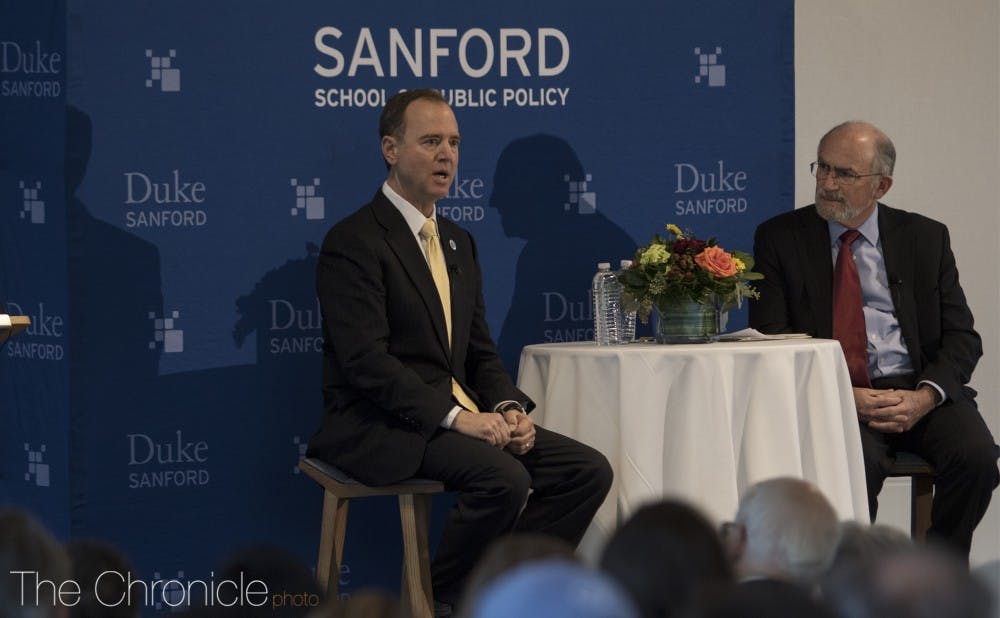Speaking to a sold-out crowd at Penn Pavilion Monday, U.S. Rep. Adam Schiff (D-Calif.) connected recent developments in the Russia investigation to President Donald Trump's campaign and said the government's checks and balances are being removed "brick by brick."
Schiff, the ranking member of the House's Permanent Select Committee on Intelligence—one of the bodies overseeing the investigation into Russia's interference in the 2016 election—was the featured speaker at the Terry Sanford Distinguished Lecture.
In the discussion moderated by Bruce Jentleson, professor in the Sanford School of Public Policy, the congressman said that the recent developments in the Russia investigation raise new questions about the Trump campaign's ties with Russia.
The talk came hours after the Justice Department revealed that Paul Manafort, Trump's former campaign manager, and his associate Richard Gates were indicted and surrendered to the FBI. Manafort and Gates pleaded not guilty to all charges.
Schiff said the indictments were an important development in the Russia investigation.
"The indictment alleges a fairly broad scheme: conspiracy to launder money, failed to report work that was done as effectively as a lobbyist or a representative of a foreign government," Schiff said. "What is significant to me in terms of this investigation, because a lot of those allegations had been in the public domain, is the work that Manafort was doing in Ukraine was on behalf of a pro-Russian interest in Ukraine."
The congressman also spoke about George Papadopoulos, a former foreign policy advisor to the Trump campaign who pleaded guilty to lying to federal agents about his Russian contacts. Papadopoulos allegedly spoke to a Russian professor with close ties to the Russian government about securing damaging information on Democratic presidential candidate Hillary Clinton.
Schiff expressed optimism that the former aide would come forward and assist the House Intelligence Committee in its inquiries into the Russian investigation. He noted that the guilty plea raises questions about a meeting in Trump Tower where Donald Trump Jr., Trump's eldest son, met with other Russians who were promising damaging information on Clinton.
“That may explain why at a pivotal time in the campaign, three of the top people in the campaign—the President’s son, the President’s son-in-law [Jared Kushner] and Paul Manafort—were so eager to take that meeting in Trump Tower with the promise of information that the Russians were saying was dirt on Hillary Clinton as a part of the Russian government effort to help the campaign,” Schiff said.
The congressman emphasized that the investigation by his committee and other congressional committees are separate from special counsel Robert Mueller's investigation into Russian meddling. He said that while the special counsel determines whether any U.S. law was broken and who should be prosecuted, Congress has an obligation to inform the American public about the results of general Russia investigation in a clear manner.
"This is very important because that’s our job in Congress," he said. "We ought to lay out the length and breadth of what happened. 'This is what the Russians did, and this is how they did it.'"
Schiff also spoke about topics unrelated to the developments in the Russia investigation.
The congressman brought up Trump’s unconventional usage of the pardon with Joe Arpaio—who served as sheriff of Maricopa County, Ariz., for 24 years—noting that unlike other with presidential pardons, Trump's pardon came without waiting for any recommendation from the Justice Department nor for criminal proceedings to be completed. To Schiff, the president's message with the pardon was simple—“if you have my back, I will have yours.”
Arpaio's pardon also brought into question whether the president’s pardon power is unlimited, Schiff said.
If the power to pardon is unlimited, Schiff said a president could instruct members of the Justice Department to conduct illegal activity, and simply pardon them if caught. The president having unfettered power to dole out pardons to anyone with whom he has allegiances would “completely undermine our justice system," he added.
"People have been opining that the pardon power is absolute. It is not absolute," Schiff said. "The pardon power does not include the power to obstruct justice."
Schiff called on his Republican colleagues to come forward now and challenge the president's misuse of pardons.
"We need to speak out now. Not just when there is a constitutional crisis. Make it known that you will not sit by and let the pardon power be abused," he said.
Get The Chronicle straight to your inbox
Signup for our weekly newsletter. Cancel at any time.

Stefanie Pousoulides is The Chronicle's Investigations Editor. A senior from Akron, Ohio, Stefanie is double majoring in political science and international comparative studies and serves as a Senior Editor of The Muse Magazine, Duke's feminist magazine. She is also a former co-Editor-in-Chief of The Muse Magazine and a former reporting intern at PolitiFact in Washington, D.C.

